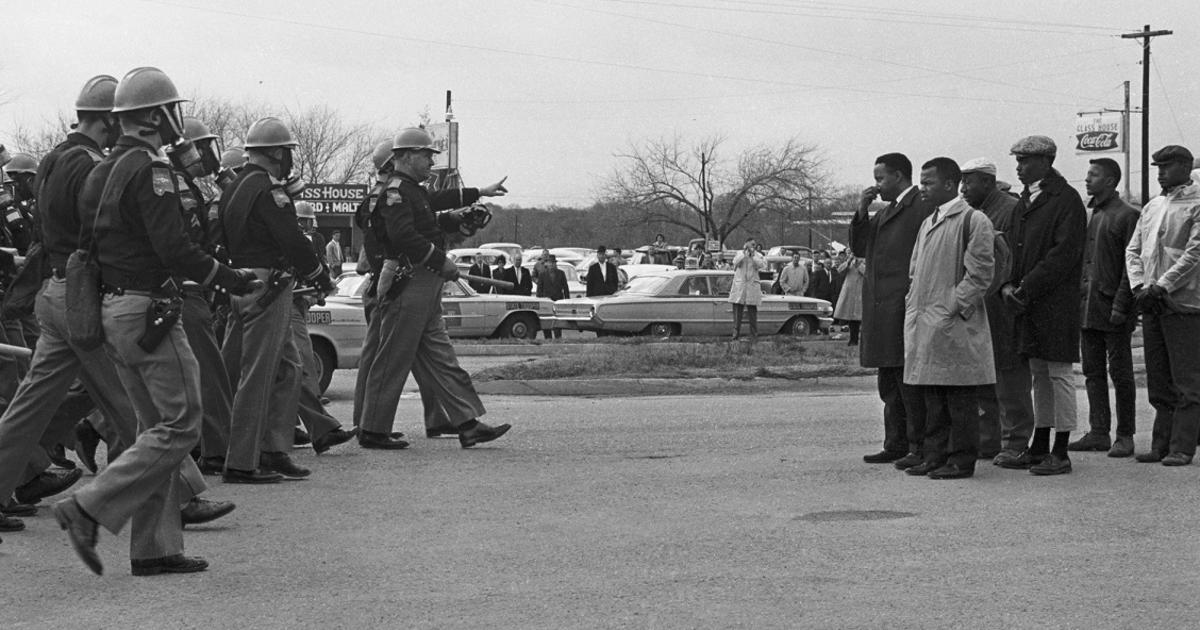

Today is the 56th anniversary of Bloody Sunday, and the first anniversary without the legendary John Lewis to commemorate this historic date.

On March 7, 1965, an estimated 525 to 600 civil rights marchers headed southeast out of Selma, Alabama on U.S. Highway 80. The march was led by John Lewis of SNCC and the Reverend Hosea Williams of SCLC, followed by Bob Mants of SNCC and Albert Turner of SCLC. The protest went according to plan until the marchers crossed the Edmund Pettus Bridge, where they encountered a wall of state troopers and county posse waiting for them on the other side.

County sheriff Jim Clark had issued an order for all white men in Dallas County over the age of twenty-one to report to the courthouse that morning to be deputized. Commanding officer John Cloud told the demonstrators to disband at once and go home. Rev. Hosea Williams tried to speak to the officer, but Cloud curtly informed him there was nothing to discuss. Seconds later, the troopers began shoving the demonstrators, knocking many to the ground and beating them with nightsticks. Another detachment of troopers fired tear gas, and mounted troopers charged the crowd on horseback.
Televised images of the brutal attack presented Americans and international audiences with horrifying images of marchers left bloodied and severely injured, and roused support for the Selma Voting Rights Campaign. Amelia Boynton, who had helped organize the march as well as marching in it, was beaten unconscious. A photograph of her lying on the road of the Edmund Pettus Bridge appeared on the front page of newspapers and news magazines around the world. Another marcher, Lynda Blackmon Lowery, age 14, was brutally beaten by a police officer during the march, and needed seven stitches for a cut above her right eye and 28 stitches on the back of her head. John Lewis suffered a skull fracture and bore scars on his head from the incident for the rest of his life. In all, 17 marchers were hospitalized and 50 treated for lesser injuries; the day soon became known as “Bloody Sunday” within the black community.
After the march, President Johnson issued an immediate statement “deploring the brutality with which a number of Negro citizens of Alabama were treated”. He also promised to send a voting rights bill to Congress that week, although it took him until March 15.
SNCC officially joined the Selma campaign, putting aside their qualms about SCLC’s tactics in order to rally for “the fundamental right of protest”. SNCC members independently organized sit-ins in Washington, DC, the following day, occupying the office of Attorney General Nicholas Katzenbach until they were dragged away.
The Executive Board of the NAACP unanimously passed a resolution the day after “Bloody Sunday”, warning,
If Federal troops are not made available to protect the rights of Negroes, then the American people are faced with terrible alternatives. Like the citizens of Nazi-occupied France, Negroes must either submit to the heels of their oppressors or they must organize underground to protect themselves from the oppression of Governor Wallace and his storm troopers.
In response to “Bloody Sunday,” labor leader Walter Reuther sent a telegram on March 9 to President Johnson, reading in part:
Americans of all religious faiths, of all political persuasions, and from every section of our Nation are deeply shocked and outraged at the tragic events in Selma Ala., and they look to the Federal Government as the only possible source to protect and guarantee the exercise of constitutional rights, which is being denied and destroyed by the Dallas County law enforcement agents and the Alabama State troops under the direction of Governor George Wallace. Under these circumstances, Mr President, I join in urging you to take immediate and appropriate steps including the use of Federal marshals and troops if necessary, so that the full exercise of constitutional rights including free assembly and free speech be fully protected.

On March 15, the president convened a joint session of Congress, outlined his new voting rights bill, and demanded that they pass it. In a historic presentation carried nationally on live television, making use of the largest media network, Johnson praised the courage of African-American activists. He called Selma “a turning point in man’s unending search for freedom” on a par with the Battle of Appomattox in the American Civil War. Johnson added that his entire Great Society program, not only the voting rights bill, was part of the Civil Rights Movement. He adopted language associated with Dr. King, declaring that “it is not just Negroes, but really it is all of us, who must overcome the crippling legacy of bigotry and injustice. And we shall overcome.” Afterward, King sent a telegram to Johnson congratulating him for his speech, calling it “the most moving eloquent unequivocal and passionate plea for human rights ever made by any president of this nation”. Johnson’s voting rights bill was formally introduced in Congress two days later.
